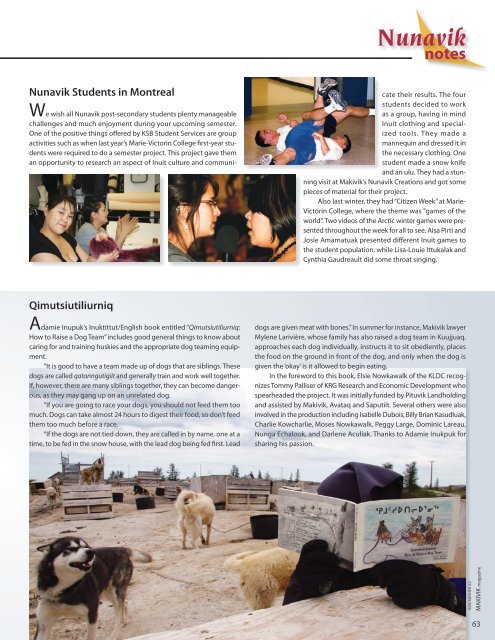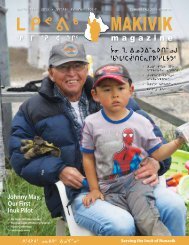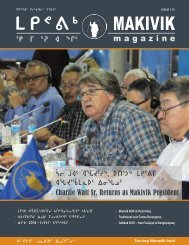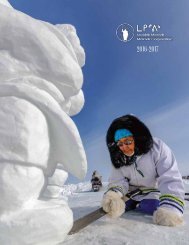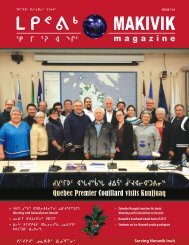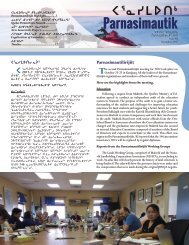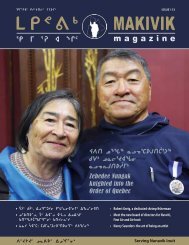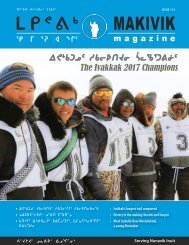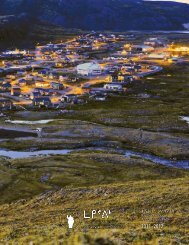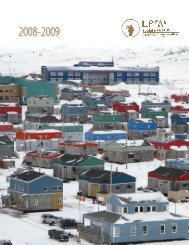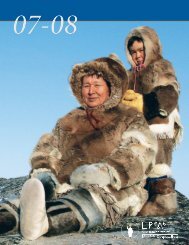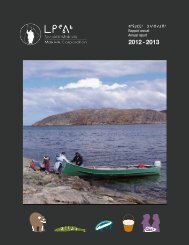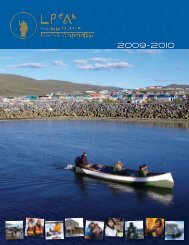Create successful ePaper yourself
Turn your PDF publications into a flip-book with our unique Google optimized e-Paper software.
Nunavik Students in Montreal<br />
We wish all Nunavik post-secondary students plenty manageable<br />
challenges and much enjoyment during your upcoming semester.<br />
One of the positive things offered by KSB Student Services are group<br />
activities such as when last year’s Marie-Victorin College first-year students<br />
were required to do a semester project. This project gave them<br />
an opportunity to research an aspect of Inuit culture and communi-<br />
cate their results. The four<br />
students decided to work<br />
as a group, having in mind<br />
Inuit clothing and specialized<br />
tools. They made a<br />
mannequin and dressed it in<br />
the necessary clothing. One<br />
student made a snow knife<br />
and an ulu. They had a stunning<br />
visit at <strong>Makivik</strong>’s Nunavik Creations and got some<br />
pieces of material for their project.<br />
Also last winter, they had “Citizen Week” at Marie-<br />
Victorin College, where the theme was "games of the<br />
world". Two videos of the Arctic winter games were presented<br />
throughout the week for all to see. Aisa Pirti and<br />
Josie Amamatuak presented different Inuit games to<br />
the student population, while Lisa-Louie Ittukalak and<br />
Cynthia Gaudreault did some throat singing.<br />
Qimutsiutiliurniq<br />
Adamie Inupuk’s Inuktittut/English book entitled “Qimutsiutiliurniq:<br />
How to Raise a Dog Team” includes good general things to know about<br />
caring for and training huskies and the appropriate dog teaming equipment.<br />
“It is good to have a team made up of dogs that are siblings. These<br />
dogs are called qatanngutigiit and generally train and work well together.<br />
If, however, there are many siblings together, they can become dangerous,<br />
as they may gang up on an unrelated dog.<br />
“If you are going to race your dogs, you should not feed them too<br />
much. Dogs can take almost 24 hours to digest their food, so don’t feed<br />
them too much before a race.<br />
“If the dogs are not tied down, they are called in by name, one at a<br />
time, to be fed in the snow house, with the lead dog being fed first. Lead<br />
dogs are given meat with bones.” In summer for instance, <strong>Makivik</strong> lawyer<br />
Mylene Larivière, whose family has also raised a dog team in Kuujjuaq,<br />
approaches each dog individually, instructs it to sit obediently, places<br />
the food on the ground in front of the dog, and only when the dog is<br />
given the ‘okay’ is it allowed to begin eating.<br />
In the foreword to this book, Elsie Nowkawalk of the KLDC recognizes<br />
Tommy Palliser of KRG Research and Economic Development who<br />
spearheaded the project. It was initially funded by Pituvik Landholding<br />
and assisted by <strong>Makivik</strong>, Avataq and Saputiit. Several others were also<br />
involved in the production including Isabelle Dubois, Billy Brian Kasudluak,<br />
Charlie Kowcharlie, Moses Nowkawalk, Peggy Large, Dominic Lareau,<br />
Nunga Echalook, and Darlene Aculiak. Thanks to Adamie Inukpuk for<br />
sharing his passion.<br />
bob mesher x2<br />
MAKIVIK mag a zine<br />
63


